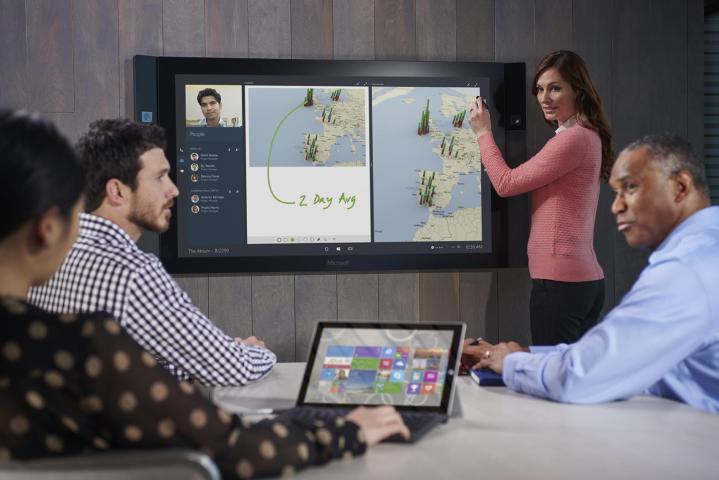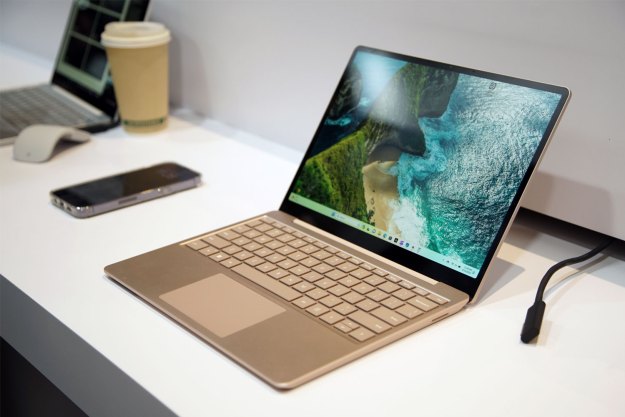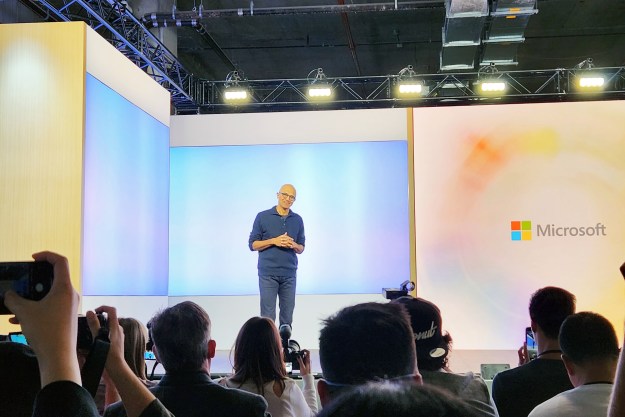
“We have built Surface Hub as a group,” Hall writes. “We have been building our Surface products with Surface Hub. Even more importantly, we have seen how innovative businesses and partners have embraced this opportunity to pioneer new ways for groups to work together. They have been our inspiration.”
The 55-inch model packs a 1,920 x 1,080 resolution at 120Hz, a contrast ratio of 1,300:1, and an optically bonded sensor capable of 100-point multitouch input. The device also consists of 8GB of RAM, a 128GB SSD, a fourth-generation Intel Core i5 processor, and Intel HD 4600 graphics. There are also a number of ports along with gigabit Ethernet, Wireless N, and Bluetooth 4.0 Low Energy connectivity, and an NFC reader. It even comes with two built-in 1080p cameras, a microphone, two powered pens, and naturally Windows 10 with Office.
If that’s not big enough, the 80-inch model should do the trick. It packs a screen resolution of 3,840 x 2,160 at 120Hz, a contrast ratio of 1,400:1, and the same 100-point multitouch sensor. Additional ingredients include 8GB of RAM, a 128GB SSD, a fourth-generation Intel Core i7 processor, and Nvidia’s Quadro K2200 chip to handle the graphics. Everything else appears to be the same as what’s found on the 55-inch model, including the wireless All-In-One keyboard, and infrared, imaging, and depth sensors.
According to Hall, Office Hub is already installed in a number of organizations including the European School of Management and Technology, the Children’s Hospital of Philadelphia, Barlit Beck, SHoP Architects, AstraZeneca, and more. He says the Children’s Hospital of Philadelphia is actually calling Surface Hub a “game changer,” as it has replaced its outdated whiteboard system used to manage scheduling for doctors and the medical staff.
Companies that have installed Surface Hub in their meeting rooms and collaboration spaces supposedly have seen a 75-percent improvement in remote attendance and post-meeting productivity. They’ve also experienced a decrease in printing costs of nearly $9,000 in the first year of using Surface Hub, as it allows users to make changes and group notes without having to make paper copies. There’s also a 20-percent rise in sales thanks to streamlined collaboration with clients via the Microsoft device, Hall reports.
Of course, the big deal here is that Surface Hub is based on Windows 10, which allows businesses to install Universal Windows Platform-based apps on the device, such as Skype for Business, Office, and OneNote. Windows 10 itself was built with businesses and touch-based interactions in mind, allowing users to quickly grab a stylus pen or use their finger to use and manipulate apps. Heck, businesses can even create their own apps for the Surface Hub.
Companies and organizations wanting to jump on the Surface Hub bandwagon can find a list of resellers here. Outlets include CDW, PC Connection, Tech Data, Datavision, and loads more. However, take note that the Surface Hub weighs 105 pounds for the 55-inch model and 280 pounds for the 84-inch model, meaning don’t assume you’ll be merely mounting a massive tablet onto the wall. Make sure it’s not hanging over someone’s head either — that could be messy.
Editors' Recommendations
- Surface Pro 10 and Surface Laptop 6 have arrived — with a catch
- The Surface Pro 10 sounds amazing, and it may be coming soon
- This might be a big year for the Surface after all
- I’m worried about the future of the Microsoft Surface
- This sleeper Asus laptop is faster and cheaper than Microsoft’s Surface Laptop Go 3


